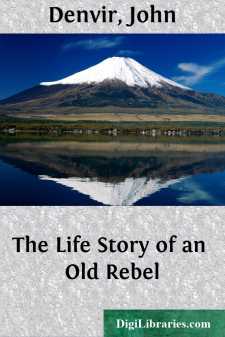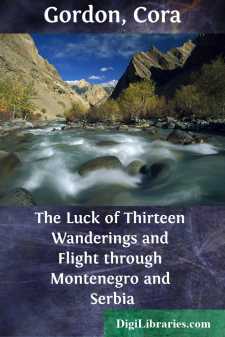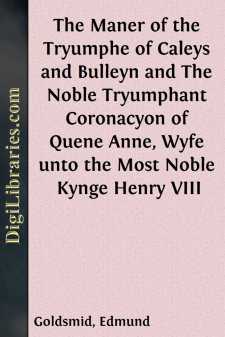History
- Africa 30
- Americas (North Central South West Indies) 50
- Ancient 68
- Asia 58
- Australia & New Zealand 8
- Canada 41
- Caribbean & West Indies 1
- Civilization 20
- Eastern Europe 12
- Europe
- Expeditions & Discoveries 60
- General 77
- Historical Geography 1
- Jewish 9
- Latin America 3
- Medieval 8
- Middle East 13
- Military 248
- Revolutionary 8
- Study & Teaching 5
- United States 353
- Western Europe 56
- World 13
Europe Books
Sort by:
This life of Napoleon was first published in 1896 as a book: for the years 1895-96 it ran as a serial in the pages of the Century Magazine. Judging from the sales, it has been read by many tens if not hundreds of thousands of readers; and it has been extensively noticed in the critical journals of both worlds. Throughout these fourteen years the demand has been very large and steady, considering the...
more...
CHAPTER I. War With Russia: Pultusk. Poland and the Poles — The Seat of War — Change in the Character of Napoleon's Army — The Battle of Pultusk — Discontent in the Grand Army — Homesickness of the French — Napoleon's Generals — His Measures of Reorganization — Weakness of the Russians — The Ability of Bennigsen — Failure of the Russian Manœuvers — Napoleon in Warsaw....
more...
CHAPTER IPARENTAGE AND EARLY YEARS "I was born when my country was perishing. Thirty thousand French vomited upon our coasts, drowning the throne of Liberty in waves of blood, such was the sight which struck my eyes." This passionate utterance, penned by Napoleon Buonaparte at the beginning of the French Revolution, describes the state of Corsica in his natal year. The words are instinct with...
more...
CHAPTER I PARENTAGE AND EARLY YEARS "I was born when my country was perishing. Thirty thousand French vomited upon our coasts, drowning the throne of Liberty in waves of blood, such was the sight which struck my eyes." This passionate utterance, penned by Napoleon Buonaparte at the beginning of the French Revolution, describes the state of Corsica in his natal year. The words are instinct with...
more...
by:
John Denvir
CHAPTER I. EARLY RECOLLECTIONS—"COMING OVER" FROM IRELAND. I owe both the title of this book and the existence of the book itself to the suggestion of friends. I suppose a man of 76 may be called "old," although I have by no means given up the idea that I can still be of use to my country. And a Rebel? Yes! Anything of the nature of injustice or oppression has always stirred me to...
more...
by:
Cora Gordon
INTRODUCTION It is curious to follow anything right back to its inception, and to discover from what extraordinary causes results are due. It is strange, for instance, to find that the luck of the thirteen began right back at the time when Jan, motoring back from Uzhitze down the valley of the Morava, coming fastish round a corner, plumped right up to the axle in a slough of clinging wet sandy mud. The...
more...
by:
Edmund Goldsmid
Cum Priuilegio. I will certyfye you of our newes in the partyes of Caleys. Fyrst the xj. day of October whiche was Fryday in the mornyng at. v. of the clocke the kynges grace toke his Shyppe called the Swallowe and so came to Caleys by. x. of the clocke. And there he was receyved with processyon and with the mayre and the lorde delite and all the speres and the sowdyours in araye with a greate peale...
more...
ORIGINAL PREFACE. Our Author, John Francis Paul de Gondi, Cardinal de Retz, Sovereign of Commercy, Prince of Euville, second Archbishop of Paris, Abbot of Saint Denis in France, was born at Montmirail, in Brie, in October, 1614. His father was Philippe Emanuel de Gondi, Comte, de Joigni, General of the Galleys of France and Knight of the King's Orders; and his mother was Frances Marguerite,...
more...
Our Author, John Francis Paul de Gondi, Cardinal de Retz, Sovereign ofCommercy, Prince of Euville, second Archbishop of Paris, Abbot of SaintDenis in France, was born at Montmirail, in Brie, in October, 1614. His father was Philippe Emanuel de Gondi, Comte, de Joigni, General ofthe Galleys of France and Knight of the King's Orders; and his mother wasFrances Marguerite, daughter of the Comte de...
more...
MADAME:—I lay it down as a maxim, that men who enter the service of the State should make it their chief study to set out in the world with some notable act which may strike the imagination of the people, and cause themselves to be discussed. Thus I preached first upon All Saints' Day, before an audience which could not but be numerous in a populous city, where it is a wonder to see the...
more...









![The Memoirs of Cardinal de Retz - Complete [Historic court memoirs]](https://digilibraries-com.s3.eu-central-1.amazonaws.com/covers/12ec7622-5676-446d-88a4-e60a3d03ce34.jpg)
![The Memoirs of Cardinal de Retz - Volume 1 [Historic court memoirs]](https://digilibraries-com.s3.eu-central-1.amazonaws.com/covers/6ce9e946-25c8-4e38-b8c3-7fabf1a28727.jpg)
![The Memoirs of Cardinal de Retz - Volume 2 [Historic court memoirs]](https://digilibraries-com.s3.eu-central-1.amazonaws.com/covers/547d283e-2e95-4a35-bf95-e573caadc705.jpg)